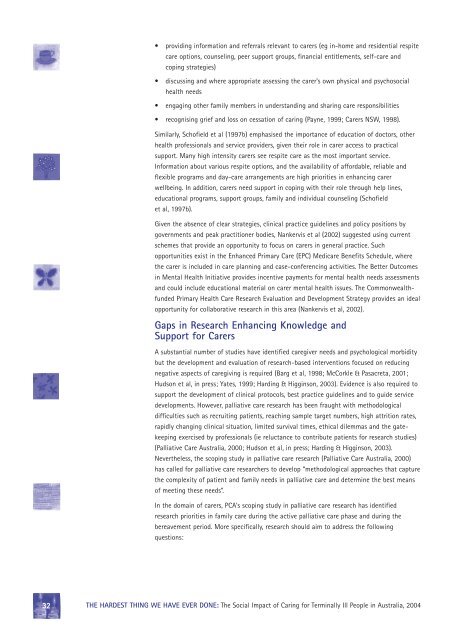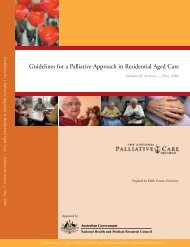The hardest thing we have ever done - Palliative Care Australia
The hardest thing we have ever done - Palliative Care Australia
The hardest thing we have ever done - Palliative Care Australia
Create successful ePaper yourself
Turn your PDF publications into a flip-book with our unique Google optimized e-Paper software.
• providing information and referrals relevant to carers (eg in-home and residential respite<br />
care options, counseling, peer support groups, financial entitlements, self-care and<br />
coping strategies)<br />
• discussing and where appropriate assessing the carer’s own physical and psychosocial<br />
health needs<br />
• engaging other family members in understanding and sharing care responsibilities<br />
• recognising grief and loss on cessation of caring (Payne, 1999; <strong>Care</strong>rs NSW, 1998).<br />
Similarly, Schofield et al (1997b) emphasised the importance of education of doctors, other<br />
health professionals and service providers, given their role in carer access to practical<br />
support. Many high intensity carers see respite care as the most important service.<br />
Information about various respite options, and the availability of affordable, reliable and<br />
flexible programs and day-care arrangements are high priorities in enhancing carer<br />
<strong>we</strong>llbeing. In addition, carers need support in coping with their role through help lines,<br />
educational programs, support groups, family and individual counseling (Schofield<br />
et al, 1997b).<br />
Given the absence of clear strategies, clinical practice guidelines and policy positions by<br />
governments and peak practitioner bodies, Nankervis et al (2002) suggested using current<br />
schemes that provide an opportunity to focus on carers in general practice. Such<br />
opportunities exist in the Enhanced Primary <strong>Care</strong> (EPC) Medicare Benefits Schedule, where<br />
the carer is included in care planning and case-conferencing activities. <strong>The</strong> Better Outcomes<br />
in Mental Health Initiative provides incentive payments for mental health needs assessments<br />
and could include educational material on carer mental health issues. <strong>The</strong> Common<strong>we</strong>althfunded<br />
Primary Health <strong>Care</strong> Research Evaluation and Development Strategy provides an ideal<br />
opportunity for collaborative research in this area (Nankervis et al, 2002).<br />
Gaps in Research Enhancing Knowledge and<br />
Support for <strong>Care</strong>rs<br />
A substantial number of studies <strong>have</strong> identified caregiver needs and psychological morbidity<br />
but the development and evaluation of research-based interventions focused on reducing<br />
negative aspects of caregiving is required (Barg et al, 1998; McCorkle & Pasacreta, 2001;<br />
Hudson et al, in press; Yates, 1999; Harding & Higginson, 2003). Evidence is also required to<br />
support the development of clinical protocols, best practice guidelines and to guide service<br />
developments. Ho<strong>we</strong>ver, palliative care research has been fraught with methodological<br />
difficulties such as recruiting patients, reaching sample target numbers, high attrition rates,<br />
rapidly changing clinical situation, limited survival times, ethical dilemmas and the gatekeeping<br />
exercised by professionals (ie reluctance to contribute patients for research studies)<br />
(<strong>Palliative</strong> <strong>Care</strong> <strong>Australia</strong>, 2000; Hudson et al, in press; Harding & Higginson, 2003).<br />
N<strong>ever</strong>theless, the scoping study in palliative care research (<strong>Palliative</strong> <strong>Care</strong> <strong>Australia</strong>, 2000)<br />
has called for palliative care researchers to develop “methodological approaches that capture<br />
the complexity of patient and family needs in palliative care and determine the best means<br />
of meeting these needs”.<br />
In the domain of carers, PCA’s scoping study in palliative care research has identified<br />
research priorities in family care during the active palliative care phase and during the<br />
bereavement period. More specifically, research should aim to address the following<br />
questions:<br />
32 THE HARDEST THING WE HAVE EVER DONE: <strong>The</strong> Social Impact of Caring for Terminally Ill People in <strong>Australia</strong>, 2004
















